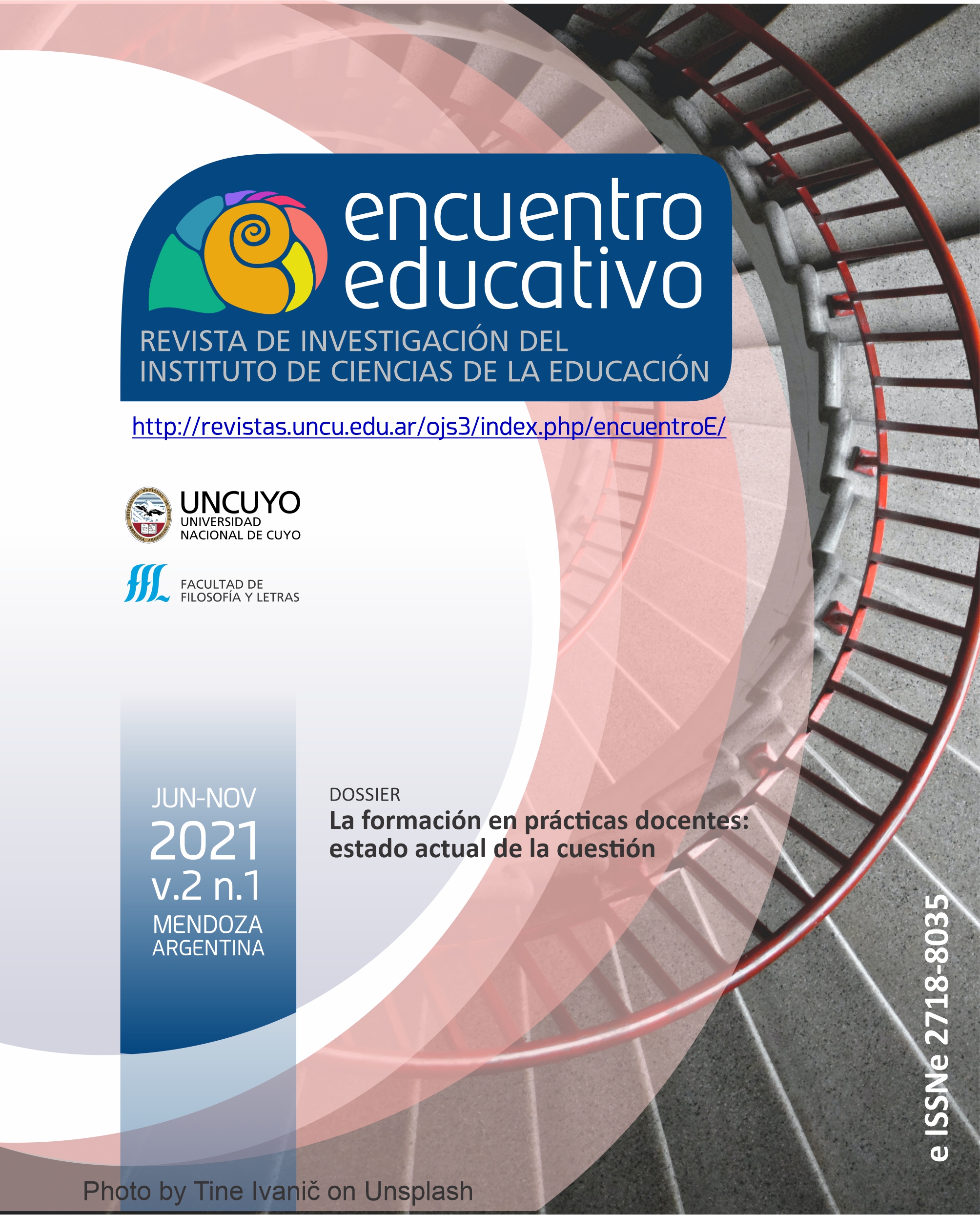The pedagogical relation in the education practices
Keywords:
pedagogical relation, teacher education, profession, practice, universityAbstract
Professional education is one of the proper practices of the university teaching function. We define this education as a practice that is carried out in a space and time socially recognized by the transformations it produces in search of the constitution of a professional. This shared project makes possible the particular relationships ensemble of all the sayings(speeches), doings(activities and work) and relations (of power, of inclusion or exclusion, of connections) that identify as such. In this practices, teachers and students establish pedagogical relationships, meaning, interactions that are characterized by being mediated by professional knowledge that needs to be learned.
In this work we seek, first of all, to characterize the pedagogical relationship, starting from the presentation of three recurring forms that we have conceptualized in our research and advisory work, namely: relationships of imposition – resistance, professionalization and accompaniment. Secondly, from a comprehensive point of view, we intend to outline some aspects that enable us to reflect on the pedagogical relationship in the university education. Thus, the senses granted to the education for the profession, the authority and the possibility of authorizing the other, together with the construction with the other are the features that insistently emerge from the presented cases.
References
Ardoino (2000). Del “acompañamiento” como paradigma. En Pratiques de formation analyses. 35.(pp. 12-18). Université Paris VIII.
Barbier, J. M. (1996). Análisis de las prácticas: temas conceptuales. En C. Blanchard Laville & D. Fablet (eds.), L´Analyse des pratiques profesionnelles. (pp. 23-43). L’Harmattan.
Barbier, J. M. (1999). Prácticas de formación, evaluación y análisis. Ediciones Novedades Educativas.
Bárcena, F. (2012). El aprendiz eterno. Miño y Dávila.
Berenstein, I. (2004). Devenir otro con otro(s): ajenidad, presencia, interferencia. Paidós.
Berenstein, I. (2008). Del ser al hacer. Paidós.
Bion, W. (1974). Atención e interpretación. Paidós.
Blanchard Laville, C. (1996). Saber y relación pedagógica. Facultad de Filosofía y Letras y Novedades Educativas.
Blanchard-Laville, C. (2009). Los docentes, entre placer y sufrimiento. Casa abierta al tiempo.
Cornú, L. (1999). La confianza en las relaciones pedagógicas. En G. Frigerio, M. Poggi y D. Korinfeld. (eds.), Construyendo un saber sobre el interior de la escuela (pp. 19-26). Novedades Educativas.
Cornú, L. (2002) Responsabilidad, experiencia, confianza. En G. Frigerio(ed.), Educar: rasgos filosóficos para la identidad (pp. 43-83). Santillana.
Coulon, A. (1993). Etnometodología y educación. Paidós.
De Certeau, M. (1996). La invención de lo cotidiano I. Artes de hacer. Universidad Iber. ITESO. CFEMyC.
De Certeau, M. (1999). La cultura en plural. Ediciones Nueva Visión.
Doyle, W. (1983). Trabajo Académico. En Didáctica II, Nº 2, Aportes Teóricos (pp. 5-25). Facultad de Filosofía y Letras. UBA.
Edwards, V. (1997). Las formas del conocimiento en el aula. En E. Rockwell (coord.) La escuela cotidiana (pp.145-172). FCE.
Filloux, J. C. (2001). Campo pedagógico y psicoanálisis. Nueva Visión.
Ferry, G. (1997). Pedagogía de la formación. Ediciones Novedades Educativas.
Giddens, A. (1993). Consecuencias de la modernidad. Alianza.
Käes, R., Bleger, J., Enriquez, E., Formari, F., Fustier, P., Roussillon, R. y Vidal, J. P. (1998). La institución y las instituciones. Paidós.
Kemmis, S. (2010). What is professional practice? Recognizing and respecting diversity in understandings of practice”. En K. Clive (ed.) Elaborating professionalism: Studies in practice and theory. (pp.1-31). Springer.
Kemmis, S., Wilkinson, J., Edwards-Groves, C., Hardy, I., Grootenboer, P. y Bristol, L. (2014). Changing Practices, Changing Education. Springer.
Lucarelli, E. (1998). Didáctica del nivel superior sus notas distintivas. En Lucarelli, E. La didáctica del nivel Superior (pp. 3-11). Facultad de Filosofía y Letras, UBA.
Luhmann, N. (2005). Confianza. Antropos.
Mahon, K. M., Kemmis, S., Francisco, S. y Lloyd, A. (2017) Introduction: Practice Theory and the Theory of Practice Architectures. En K. Mahon, S. Francisco, y S. Kemmis (eds.). Exploring Education and Professional Practice. Springer.
Mastache, A. (1999). Documentos de Trabajo Nº 2: Representaciones Acerca de la Formación. Literatura y Mito. UBA.
Melich, J. C. (2006). Transformaciones. Tres ensayos de filosofía de la educación. Miño y Dávila.
Monetti, E. (2015). La didáctica de la cátedra universitaria. Novedades Educativas.
Monetti, E. (2018). Una mirada sobre la enseñanza desde el “giro de la práctica”. Revista de Educación, 0 (14.2), 197-215.
https://fh.mdp.edu.ar/revistas/index.php/r_educ/article/view/3048.
Monetti. E; Adrian, C. y Alarcón, S. ( 7 de agosto 2017). ¿Es posible enseñar la autoridad? . En S. Uicich (coord.) VII Jornadas de Investigación en Humanidades. Universidad Nacional del Sur.
Monetti, E. & Ruiz Barbot, M. (en prensa). La resignificación de la democratización del conocimiento en la educación superior. En E. Monetti y M. Ruiz Barbot (eds.). Pensar la democratización desde la construcción del conocimiento en la universidad. EDIUNS.
Pierella, M. P. (2014). La autoridad en la universidad: vínculos y experiencias entre estudiantes, profesores y saberes. Paidós.
Reckwitz, A. (2002). Toward a Theory of Social Practices: A Development in Culturalist Theorizing. European Journal of Social Theory 5, 243-263.
Rosales, G. A. (2015). “Hago caso porque me gusta tocar”. Procesos de construcción de autoridad pedagógica en una experiencia artístico-educativa desarrollada con adolescentes de sectores populares. Voces y silencios. Revista Latinoamericana de Educación 6 (1), 47-66.
Schatzki, T. (2001). Introduction: practice theory. En T. Schatzki, K. Knorr Cetina & E. Von Savigny (eds). The practice turn in Contemporary Theory. (pp. 10 -23) Routledge.
Schön, D. (1992). La formación de profesionales reflexivos. Paidós.
Simmel, G. (1978). The Philosophy of Money. (T. Bottomore & D. Frisby, trads.). Routledge and Paul Kegan (original publicado en 1900). http://www.eddiejackson.net/web_documents/Philosophy%20of%20Money.pdf
Wenger, E. (2001). Comunidades de práctica. Paidós


















